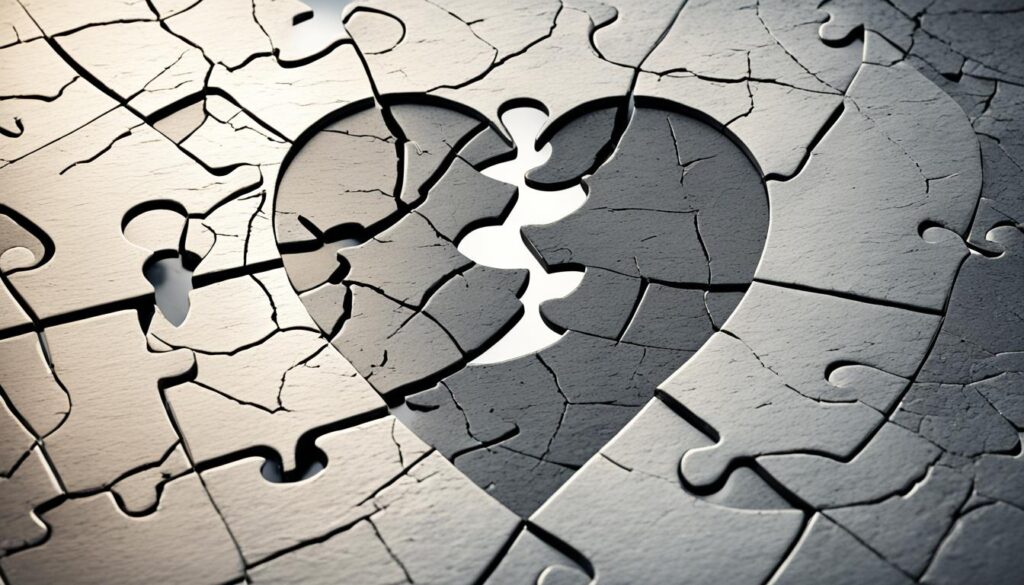“Nothing ever exists entirely alone. Everything is in relation to everything else.” – Gautama Buddha
How do you know when it’s time to break up? It’s a question many individuals in relationships find themselves pondering. Relationships are complex, and at times, it can be challenging to identify when enough is enough. However, there are vital signs to look out for that indicate it may be time to end a relationship.
In this article, we will explore the different signs of breaking up, the red flags in a relationship, and when to end a relationship. Understanding these signs can help you make informed decisions about the future of your relationship and your personal well-being.
Key Takeaways:
- Constantly breaking up and getting back together can indicate underlying issues that need addressing.
- Sacrificing more than your partner without receiving equal commitment can create an imbalance in the relationship.
- A lack of trust can erode the foundation of a healthy relationship.
- Growing apart and a loss of shared interests may signal incompatibility.
- Mismatched major values can lead to long-term dissatisfaction.
Constantly Breaking Up and Getting Back Together
If you find yourself in a cycle of constantly breaking up and getting back together with your partner, it may be a sign that the underlying issues in the relationship are not being addressed. This on-again off-again pattern, also known as an unhealthy relationship cycle, can create a rollercoaster of emotions and prevent both individuals from moving forward.
When a couple is trapped in this cycle, it can be challenging to break free and find lasting happiness. The temporary relief of reuniting often masks the deeper problems that need to be resolved. Without addressing these issues, the cycle is likely to repeat, leading to a continued state of instability and unhappiness.
The first step in breaking this pattern is recognizing that it exists. Reflect on the reasons behind the constant breakups and reconciliations. Is it due to unresolved conflicts, a lack of effective communication, or incompatible values? Understanding the root causes will help you gain clarity and make informed decisions about the future of the relationship.
Once you have identified the underlying issues, it’s crucial to have open and honest conversations with your partner. Communicate your concerns, fears, and desires, and listen to their perspective as well. It’s essential to be willing to address and work through these challenges together.
However, if you find that despite your best efforts, the cycle continues, it may be a sign that the relationship is not healthy or fulfilling for either of you. In such cases, it is important to prioritize your own well-being and consider the possibility of moving on. Remember that you deserve a relationship that brings you happiness, stability, and growth.
Breaking the Cycle: Tips for Moving Forward
To break free from the constant breaking up and getting back together cycle, consider the following strategies:
- Seek professional help: Couples therapy or relationship counseling can provide a safe space for both partners to express their feelings, explore the underlying issues, and work towards healthier relationship patterns.
- Focus on personal growth: Take time for self-reflection and personal development. Identifying and addressing your own patterns and insecurities can contribute to healthier relationships in the future.
- Set boundaries: Clearly define what is acceptable and unacceptable behavior for both partners. Boundaries help establish a sense of safety and respect within a relationship.
- Take a break: If the cycle of breaking up and getting back together becomes too emotionally draining, consider taking a temporary break to gain clarity and perspective.
- Discover your individual passions: Engage in activities and hobbies that bring you joy and fulfillment outside of the relationship. Building a strong sense of self can contribute to a healthier and more balanced partnership.
Remember, breaking unhealthy relationship patterns takes time, effort, and commitment from both partners. It’s essential to prioritize your overall well-being and seek happiness in a relationship that is supportive, stable, and fulfilling.
Sacrificing More Than Your Partner
In a healthy relationship, both partners should be willing to make sacrifices for each other. It’s a natural part of building a strong and supportive connection. However, when the balance of give and take becomes skewed, with one person consistently sacrificing more than the other, it can lead to an imbalance and resentment in the relationship.
Constantly putting your partner’s needs and desires above your own without receiving the same level of commitment or sacrifice in return can leave you feeling unfulfilled and taken for granted. This one-sided sacrifice can create a power dynamic where your needs and wants are overshadowed, leading to long-term unhappiness.
It’s important to establish healthy boundaries and communicate openly with your partner about your own needs and expectations. Remember, a relationship should be a partnership where both individuals support and uplift each other.
Here are a few signs that you may be sacrificing more than your partner:
- Putting their goals and aspirations ahead of your own
- Always compromising and rarely having your needs met
- Feeling guilty or selfish when you prioritize yourself
- Being the one to make all the concessions in arguments or conflicts
- Feeling emotionally drained from constantly giving without receiving
If you identify with any of these signs, it’s important to address the imbalance in your relationship. Openly communicate your feelings and concerns with your partner to find a solution that works for both of you. Remember, a healthy relationship involves mutual support, compromise, and equal give and take.

Lack of Trust
Trust is a fundamental pillar in any relationship. Without trust, the foundation crumbles, leaving behind doubt and uncertainty. When trust issues arise, it can create a toxic environment filled with anxiety and suspicion. Constantly questioning your partner’s honesty or feeling the need to invade their privacy by checking their phone can be emotionally draining and damaging.
If your partner has a history of lying or infidelity, it further exacerbates the lack of trust in the relationship. The pain caused by betrayal can lead to a buildup of resentment, making it difficult to rebuild the shattered trust.
Addressing trust issues requires open and honest communication. Both partners need to be willing to acknowledge and take responsibility for their actions. It’s important to establish boundaries and be transparent about expectations to rebuild a sense of trust.
However, rebuilding trust takes time and effort from both individuals. It requires consistent actions that align with promises made and a commitment to being truthful and reliable. Trust cannot be restored overnight; it requires patience, understanding, and a willingness to work through the underlying issues.
Remember, trust in a relationship is a fragile bond that should be cherished and protected. Without trust, the relationship may struggle to survive.

Signs of a Lack of Trust in a Relationship
- Constantly questioning your partner’s honesty
- Feeling the need to invade privacy and check their phone or emails
- Suspicion and paranoia without evidence
- Jealousy and possessiveness
- Continuously doubting your partner’s fidelity
- Difficulty being vulnerable and sharing personal information
- Frequent arguments and disagreements about trust-related issues
Growing Apart
Relationships evolve over time, and it’s natural for couples to experience changes in their interests, values, and communication patterns. However, if you feel a significant rift between you and your partner that can’t be explained or if it becomes increasingly difficult to communicate and share common interests, it may be a sign that you have grown apart and are no longer compatible.
Drifting apart in relationships can happen gradually, often due to a lack of communication or a loss of shared interests. As individuals grow and change, it’s essential to maintain open lines of communication and actively work on finding common ground. Without active effort, relationships can suffer from a loss of connection and understanding.
Lack of communication is a common factor that contributes to drifting apart. When partners don’t communicate their needs, desires, or concerns effectively, it can create distance and misunderstanding. Over time, unresolved issues and unexpressed feelings can erode the foundation of a relationship and lead to emotional disconnection.
Loss of shared interests is another significant indicator of growing apart. As individuals pursue their own passions and hobbies, they may find that they no longer have many activities or topics to engage in together. This lack of shared experiences can result in feelings of disconnect and isolation.

It’s important to recognize and address these signs of growing apart in a relationship. Honest and open communication is crucial to understanding each other’s needs and finding ways to reconnect. By actively fostering shared interests and dedicating time to connect, couples can work towards bridging the gap and rediscovering their compatibility.
Mismatched Major Values
A strong and fulfilling relationship relies on the compatibility of major values and life goals. When you and your partner have different visions for the future or hold conflicting core values, it can present significant challenges and lead to feelings of dissatisfaction and unfulfillment. It is crucial to have open and honest conversations with your partner about your long-term goals and evaluate if your values are truly compatible.
Incompatible values can manifest in various ways, such as:
- Different Life Goals: You may have a clear vision of what you want to achieve in life, whether it’s a successful career, starting a family, or pursuing personal passions. If your partner’s life goals do not align with yours, it can create tension and hinder your ability to support each other in achieving individual happiness and fulfillment.
- Conflicting Belief Systems: Your core values and beliefs shape your worldview and guide your actions. If you and your partner have fundamentally different belief systems, such as religious or ethical perspectives, it can lead to ongoing disagreements, resentment, and a lack of understanding.
- Divergent Financial Priorities: Money management and financial goals play a significant role in a committed relationship. If you and your partner have contrasting attitudes towards financial stability, spending habits, or long-term financial planning, it can create strain and conflict that may be difficult to reconcile.
- Diverging Personal Growth Paths: Personal growth and self-development are vital aspects of individual fulfillment. If you and your partner have different approaches to personal growth or if one of you is proactive while the other remains stagnant, it can lead to feelings of stagnation, resentment, and a lack of support for each other’s personal journeys.
It is essential to remember that every relationship is unique, and finding compatibility in major values requires ongoing effort from both partners. While some differences can be navigated and compromised upon, severe mismatches can be a sign that the relationship may not be sustainable in the long run.
Here is an insightful table summarizing the impact of mismatched major values:
| Effect of Mismatched Major Values | Consequences |
|---|---|
| Discontent and Unfulfillment | A sense of dissatisfaction and unfulfillment due to the inability to align values and goals. |
| Constant Conflict | Regular conflicts and disagreements stemming from opposing values, leading to emotional strain and potential resentment. |
| Stifling of Individual Growth | Limited support for personal growth and self-development, resulting in feelings of stagnation and missed opportunities for both partners. |
| Lack of Common Ground | Difficulty in establishing shared experiences and building a strong foundation for connection and shared meaning. |
| Reduced Emotional Intimacy | Avoidance of vulnerability and limited emotional closeness due to the absence of shared core values. |
Remember, honest reflection and open communication are key when addressing mismatched major values with your partner. It is essential to evaluate if compromises can be made or if the differences are too fundamental to overcome. Ultimately, finding someone who shares your major values can lead to a more fulfilling and harmonious relationship.

Lack of Effort and Care
Relationships require consistent effort and care from both partners. When the initial excitement fades and the honeymoon phase ends, it’s essential to continue investing time and energy into nurturing the connection. However, if you find that you and your partner have stopped putting in the necessary effort to maintain a healthy relationship, it’s a sign that something may be amiss.
One common indication of a lack of effort and care is the absence of regular check-ins with each other. Communication plays a vital role in any successful relationship, and neglecting to communicate effectively can lead to misunderstandings, unresolved conflicts, and emotional distance. When you fail to engage in open and honest conversations, important issues may go unaddressed, causing resentment to build over time. Without regular check-ins, it becomes difficult to gauge the emotional well-being of your partner and identify areas where improvements can be made.
Another sign of a dwindling effort in a relationship is the lack of attempts to reconnect. Over time, the demands of daily life and other responsibilities can take a toll on the quality time couples spend together. If both partners consistently prioritize other commitments above their relationship, it can create a growing divide and lead to feelings of neglect. The absence of shared experiences and quality time can make one or both partners feel unvalued and unimportant.
Emotional neglect is a significant consequence of a lack of effort and care. When one or both partners stop actively investing in the emotional well-being of their relationship, it can result in feelings of isolation, loneliness, and dissatisfaction. Emotional neglect can manifest in various ways, such as not showing empathy, dismissing emotional needs, or failing to provide support during challenging times. When emotional neglect becomes prevalent, it erodes the foundation of trust and intimacy, making it difficult for the relationship to thrive.
Furthermore, a loss of interest in a partner can contribute to a lack of effort and care. It’s natural for the intensity of infatuation to diminish over time, but if you or your partner consistently demonstrate disinterest or disengagement, it may be an indication that the relationship is no longer fulfilling or satisfying. When one or both partners lose interest, they may become less attentive, neglectful, or indifferent, making it challenging to maintain a sense of connection and intimacy.
It’s important to remember that relationships require ongoing effort, care, and attention. Ignoring the signs of a lack of effort and care can lead to further deterioration of the relationship. Recognizing these signs early on and addressing them through open communication, prioritizing quality time together, and showing consistent emotional support can help reignite the spark and strengthen the bond between partners.
| Signs of a Lack of Effort and Care in a Relationship |
|---|
| 1. Absence of regular check-ins and effective communication |
| 2. Neglecting to spend quality time together |
| 3. Emotional neglect and failure to meet emotional needs |
| 4. Loss of interest in a partner |
Constantly Thinking About Breaking Up
If you constantly find yourself consumed by thoughts of ending your relationship and can’t visualize a future with your partner as they currently are, it may be a clear indication that the relationship isn’t fulfilling or healthy. The doubts and uncertainties that plague your mind can be draining and hinder the possibility of finding genuine happiness for both of you.
Continuously hoping for your partner to change or wishing for a different outcome can be exhausting, leaving little room for personal growth and fulfillment. It’s crucial to listen to your inner voice and consider whether the relationship is genuinely contributing to your long-term well-being and emotional health.
Contemplating a breakup can be overwhelming and emotional, but it’s essential to prioritize your own happiness and evaluate whether the relationship aligns with your values, goals, and aspirations. Remember, you deserve a partnership that brings you joy, growth, and fulfillment. Trust yourself and have the courage to make the decisions that will lead you to a happier and more fulfilling future.

